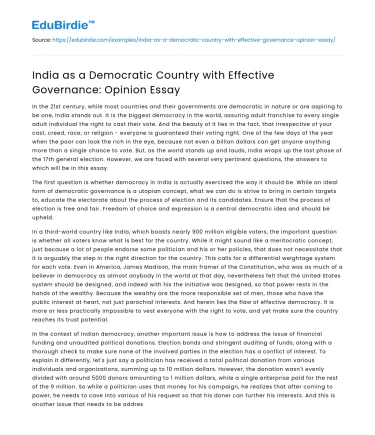In the 21st century, while most countries and their governments are democratic in nature or are aspiring to be one, India stands out. It is the biggest democracy in the world, assuring adult franchise to every single adult individual the right to cast their vote. And the beauty of it lies in the fact, that irrespective of your cast, creed, race, or religion - everyone is guaranteed their voting right. One of the few days of the year when the poor can look the rich in the eye, because not even a billion dollars can get anyone anything more than a single chance to vote. But, as the world stands up and lauds, India wraps up the last phase of the 17th general election. However, we are faced with several very pertinent questions, the answers to which will be in this essay.
The first question is whether democracy in India is actually exercised the way it should be. While an ideal form of democratic governance is a utopian concept, what we can do is strive to bring in certain targets to, educate the electorate about the process of election and its candidates. Ensure that the process of election is free and fair. Freedom of choice and expression is a central democratic idea and should be upheld.
Save your time!
We can take care of your essay
- Proper editing and formatting
- Free revision, title page, and bibliography
- Flexible prices and money-back guarantee
In a third-world country like India, which boasts nearly 900 million eligible voters, the important question is whether all voters know what is best for the country. While it might sound like a meritocratic concept, just because a lot of people endorse some politician and his or her policies, that does not necessitate that it is arguably the step in the right direction for the country. This calls for a differential weightage system for each vote. Even in America, James Madison, the main framer of the Constitution, who was as much of a believer in democracy as almost anybody in the world at that day, nevertheless felt that the United States system should be designed, and indeed with his the initiative was designed, so that power rests in the hands of the wealthy. Because the wealthy are the more responsible set of men, those who have the public interest at heart, not just parochial interests. And herein lies the flaw of effective democracy. It is more or less practically impossible to vest everyone with the right to vote, and yet make sure the country reaches its trust potential.
In the context of Indian democracy, another important issue is how to address the issue of financial funding and unaudited political donations. Election bonds and stringent auditing of funds, along with a thorough check to make sure none of the involved parties in the election has a conflict of interest. To explain it differently, let's just say a politician has received a total political donation from various individuals and organizations, summing up to 10 million dollars. However, the donation wasn't evenly divided with around 5000 donors amounting to 1 million dollars, while a single enterprise paid for the rest of the 9 million. So while a politician uses that money for his campaign, he realizes that after coming to power, he needs to cave into various of his request so that his doner can further his interests. And this is another issue that needs to be addressed.
The media, the third pillar of democracy, is an essential part of any and every democratic government. It is part of the fair and just press to bring to the forefront of the wrongdoings and shortcomings of the government. However, with the advent of various kinds of media, digital, social, and print, knowledge is in excess. Information is in excess. While processing such a huge chunk of data is difficult, accepting it and basing one's political decisions on it is furthermore dangerous. That is because of the advent of 'yellow journalism' and biased reporting. And inadvertently, they end up pushing us from one side of the political spectrum to the other. Along with a healthy handful of misinformation and fake news every single day.
And finally, has democracy lived past its shelf life? In the 21st century, when India, China, Japan, and Korea are taking giant steps towards world domination, the remarkable success of China stands out. While Chinese citizens do not enjoy freedom to the extent of someone from some of the other countries, they do have a better life and better healthcare while they take on the USA to become the biggest market in the world. Yet, it is not a democracy. The response to this would be the fact that yes, a country can be successful even when its citizens have to put up with oppression while enjoying massive government benefits. But all that can be done by a democratic country too, except it, just needs a bit of brushing up with regard to certain workings of the democratic structure.
India, as a third-world country, needs better ways to limit the power of politicians. It will cut down on corruption and rampant misuse of power. Keeping the special interest political groups like labor firms and taxi unions kept under checks. A convicted felon can not run for election. Democracy is probably one of the best forms of governance. It has aged brilliantly and just needs a few tweaks here and there and would be up and running in no time.






 Stuck on your essay?
Stuck on your essay?

